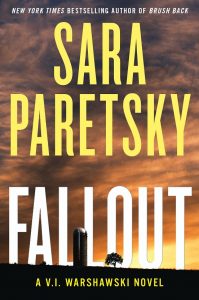Sara Paretsky is the award-winning author of the V. I. Warshawski detective novels. In 1982, when Sara wrote Indemnity Only, she revolutionized the mystery novel by creating a hard-boiled woman investigator.
Growing up in rural Kansas, Sara came to Chicago in 1966 to do community service work in the neighborhood where Martin Luth er King was organizing. Sara felt that summer changed her life; and after finishing her undergraduate degree at the University of Kansas, she returned to make Chicago her home.
er King was organizing. Sara felt that summer changed her life; and after finishing her undergraduate degree at the University of Kansas, she returned to make Chicago her home.
She received a PhD in American History and an MBA from the University of Chicago.
Sara shares her heroine’s passion for social justice. In 1986, she founded Sisters in Crime to support women mystery writers. She established a foundation to support women in the arts, letters, and sciences; and has endowed scholarships at the University of Kansas, as well as mentoring students in Chicago’s inner-city schools. She serves on various advisory boards for literacy, and for supporting the mentally-ill homeless.
Having received many literary awards, her novels have been translated into nearly 30 languages.
Fallout continues the V.I Warshawski series. V.I. is on the trail of a vanished film student and a faded Hollywood star. The film student is a prime suspect in a drug-related ransacking of a local gym. As V.I. pursues the couple, she begins to realize much more is at stake than it first appeared. As she tracks her quarry through a university town in Kansas, she encounters secrets and lies going back fifty years. As the mysteries accumulate, so does the body count.
Fallout has V.I. leaving her comfort zone, Chicago, and going to Kansas. You mention in a note that this is part of your own “origin story.” Tell us more.
I set the story in Kansas because much of the story had to do with research on biological weapons which is a field of study in which my father had been involved as a cell biologist. I could only imagine placing the story at the University of Kansas where he did his research and also taught. So, I devised a way to get V.I. out of Chicago and have her travel down the Mississippi and over to Kansas. I grew up in eastern Kansas and am very familiar with the area.
her travel down the Mississippi and over to Kansas. I grew up in eastern Kansas and am very familiar with the area.
The issue of race appears in this novel. You mentioned you relied partly on your own memories with regard to this history. Will you tell us more about that?
My father was one of the first Jews hired at the University of Kansas. When my parents had enough money to buy a house, the realtors told them there was one section of town where the Jews and African-Americans lived. Because my parents didn’t sound Jewish, they were shown homes in other areas. They opted out of the area and bought a house in the country. But that was my first exposure to issues of race in the city. We didn’t have a large African-American population, but they were barred from college-track classes at the high school, and couldn’t live in certain college housing. My father was intent on bringing students of all races and nationalities into his lab at college. Things began coming to ahead in the late 1960s and early 70s, so awareness of racial issues was part of my early life.
As the novel progresses, medicine and bacteriology come into play. How did this idea come to you?
My dad worked on an organism that causes Rocky Mountain Spotted Fever. It’s closely allied with typhus which is one of the diseases the Soviets were interested in developing as a bioweapon. Two labs doing work similar to what my father was doing were located behind the Iron Curtain. He never got permission to visit those labs.
In the mid-sixties, there was a conference about this organism held in Czechoslovakia. He attended and persuaded a technician to inject him with their strain of this organism so he could bring it home in his bloodstream in order to study it. I wanted to write that story, and did so in a short story in a collection called Ice Cold, edited by Jeffery Deaver. My father got off the plane from this conference with a fever of one-hundred and five. He didn’t start antibiotic treatment until his lab technician could take a blood sample from him. He didn’t endanger the other passengers on the plane because the disease can only be transmitted by a tick bite.
I don’t know if he was a hero, an idiot, insane or a combination of the three. So, this found its way into Fallout.
Which, if any, aspects of Sara Paretsky are embodied by V.I. Warshawski?
Oh, I would say that V.I. is the tough tenacious person I would be if I weren’t something like Hamlet, “sicklied over with a pale cast of doubt.” V.I. says the kinds of things I sometimes blurt out, but more often I only imagine saying them. In Fallout, the character Sonia has more of my tendencies.
Is there anything about your writing process that would surprise our readers?
I wish my process wasn’t so tormented. I always feel you can smell burning rubber when I’m writing. [Laughter]. I spend an inordinate amount of time trying to work out story lines. For example, right now I’m working on a book and when I got to page ninety, realized it isn’t working. So, I must burn more rubber before I can go any further.
So, the excruciating aspects of your writing process might surprise our readers?
Exactly. By the end of a novel, I send it off with a certain amount of dread because there’s chewing gum and scotch tape holding the manuscript together. [Laughter].
If you could read any one novel over again, as if it were for the first time, which would it be?
Of the books I’ve read within the last decade, certain ones stand out: Gilead by Marilynne Robinson, and Wolf Hall by Hilary Mantel.
Which book you read as a youngster has stayed with you?
Little Women was the iconic book of my childhood. I first read it when I was seven or eight. It was a bit above my reading level. Later, I read it many, many times. It was a magical book for me.
What’s coming next from Sara Paretsky?
The working title of the next novel is Shell Game, which has V.I. dealing with Syrian immigrants and ICE agents.
Congratulations on writing Fallout, a riveting novel that’s received praise from many of the biggest names in the mystery-thriller genre, including Lee Child, Lisa Gardner, Jeffery Deaver, Harlan Coben, Karin Slaughter, and C.J. Box among others.





 Lisa Gardner is one of the best-known names in all of thrillerdom. She’s received praise from Lee Child, Karin Slaughter, Tess Gerritsen, among many others. With more than 22 million books in print, she’s written an FBI profiler series; the Detective D.D. Warren series; and a number of standalone novels.
Lisa Gardner is one of the best-known names in all of thrillerdom. She’s received praise from Lee Child, Karin Slaughter, Tess Gerritsen, among many others. With more than 22 million books in print, she’s written an FBI profiler series; the Detective D.D. Warren series; and a number of standalone novels. Ace Atkins is well-known to thriller-lovers everywhere. He was a Pulitzer Prize nominated journalist, has written standalone novels, and is known for his Nick Travers and Quinn Colson series. Ace’s writing style has been compared to that of Dennis Lehane and George Pelecanos. In 2011, Ace was chosen by the estate of Robert B. Parker to continue writing the Spenser series of novels. His latest, the 4th in the series, is Kickback.
Ace Atkins is well-known to thriller-lovers everywhere. He was a Pulitzer Prize nominated journalist, has written standalone novels, and is known for his Nick Travers and Quinn Colson series. Ace’s writing style has been compared to that of Dennis Lehane and George Pelecanos. In 2011, Ace was chosen by the estate of Robert B. Parker to continue writing the Spenser series of novels. His latest, the 4th in the series, is Kickback. Gone, and Shutter Island became blockbuster movies, with the most recent film being The Drop, which is based on his short story, Animal Rescue.
Gone, and Shutter Island became blockbuster movies, with the most recent film being The Drop, which is based on his short story, Animal Rescue.